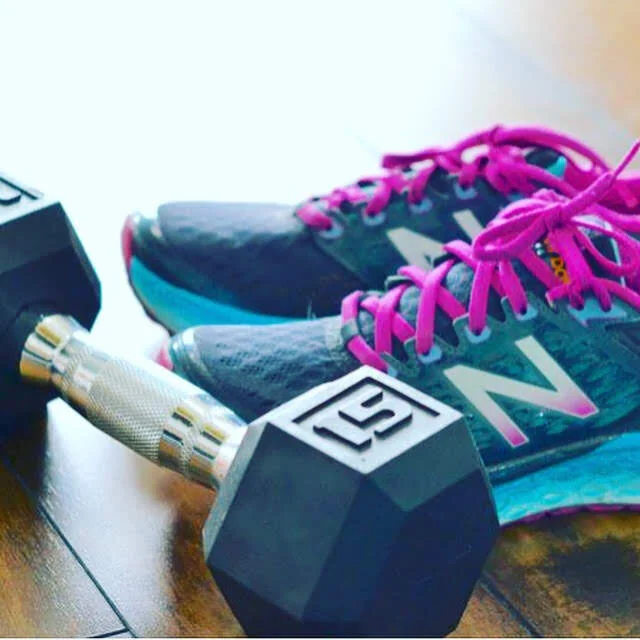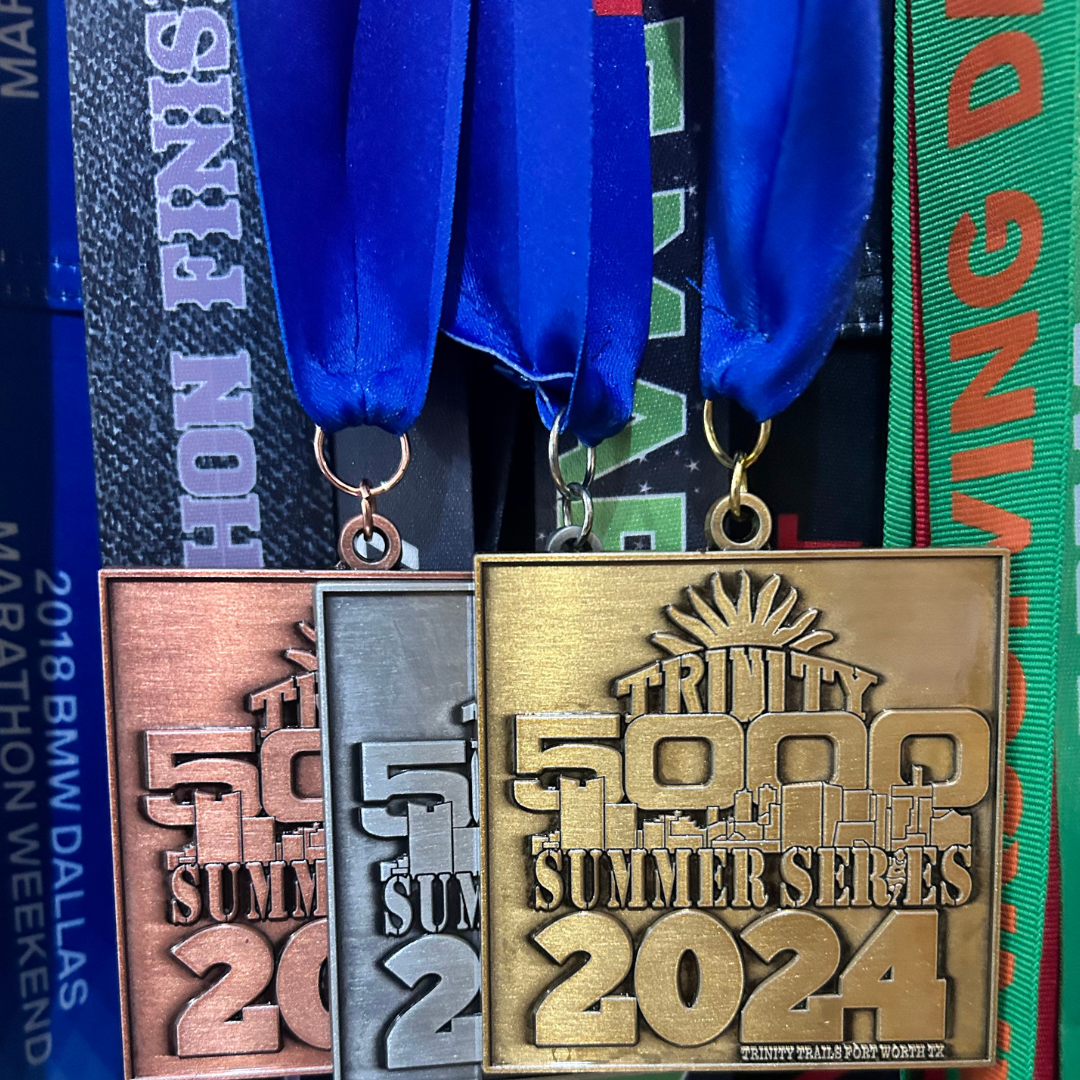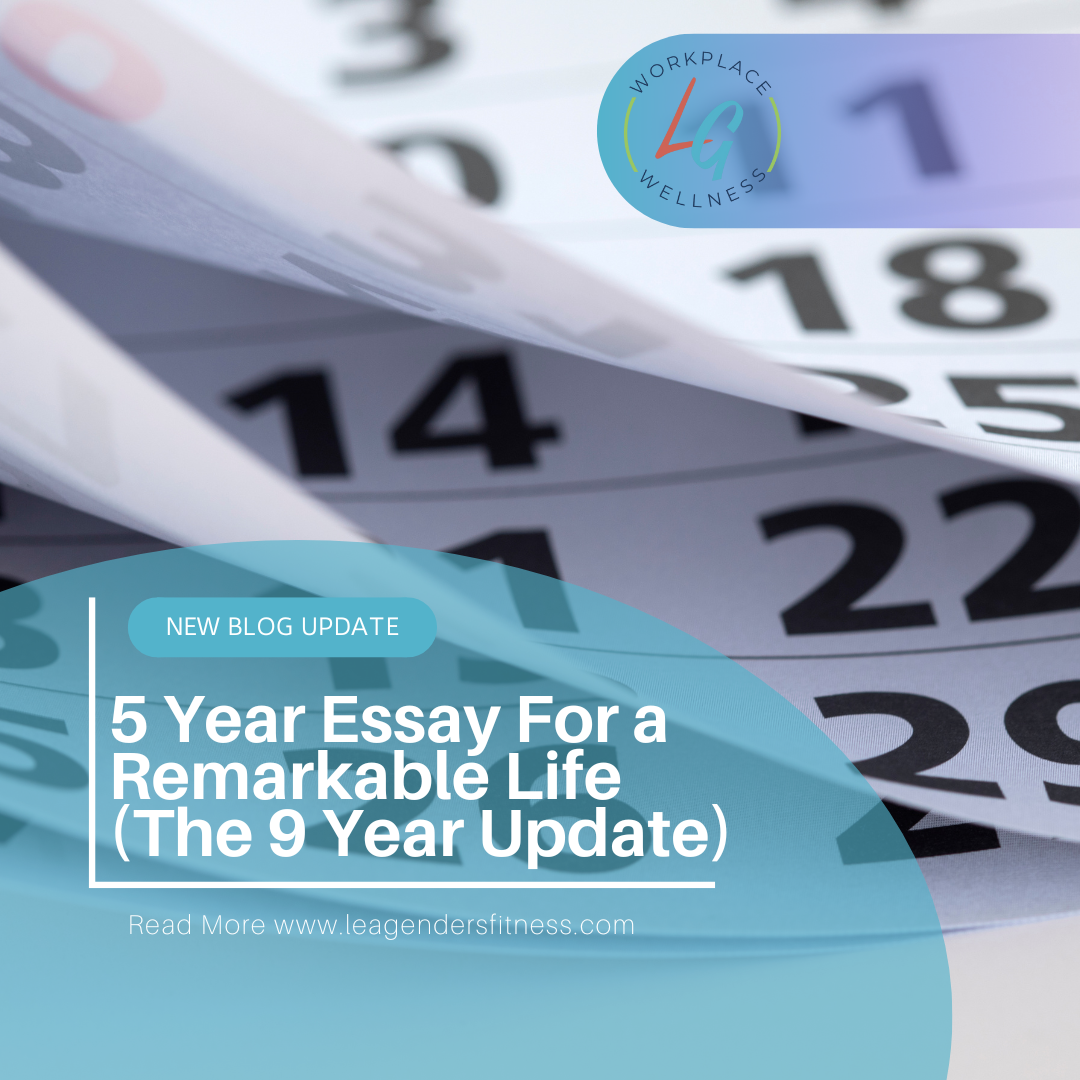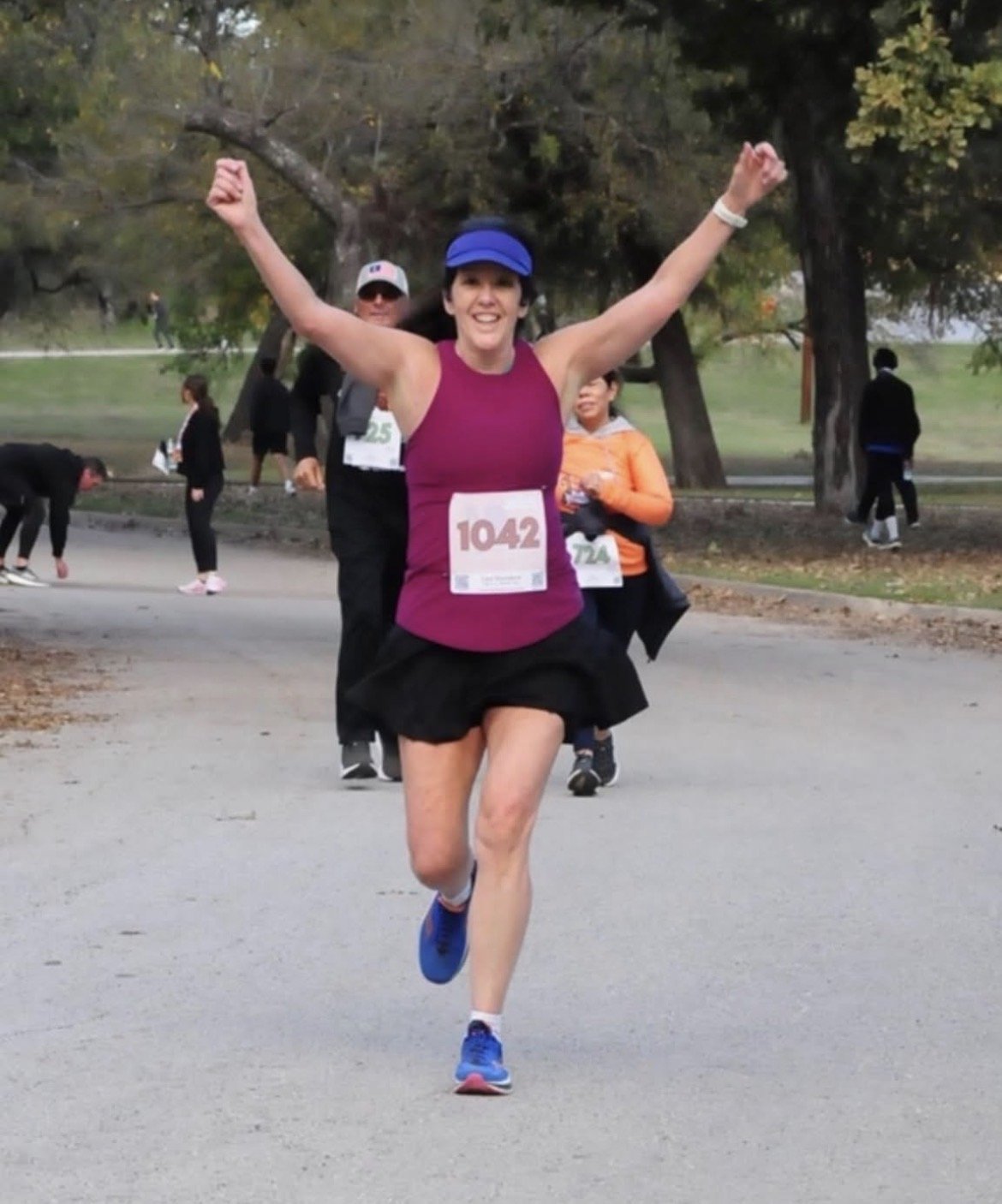A lot of nutrition guides for half marathon training are overly complicated and aimed at elite athletes, which can be intimidating for the average runner. This blog post is about taking the pressure off by treating your fueling as a personal, no-math-required experiment throughout your 12-to-16-week training cycle. As a health coach and personal trainer, my goal is to give you simple, straightforward guidelines so you can figure out what works best for your body, ensuring you have the energy needed to train well, recover fully, and cross the finish line feeling strong.
How to Use Run/Walk Intervals to Beat the Summer Heat
Run/walk intervals have been my go-to this summer for staying consistent in the Texas heat. They let me keep my heart rate in check, extend my time on my feet, and build endurance without overreaching. Whether I’m using timed segments, going by feel, or following my heart rate, the flexibility helps me adapt to the conditions and train in a way that’s sustainable. This approach works for anyone navigating challenging weather, rebuilding fitness, or simply wanting running to feel good!
12 Life Lessons Learned in 12 Weeks Running the Trinity 5000 Summer Race Series
What Kind of Psycho Runs a 12-Week 5K Race Series in the Texas Summer Heat?
I’m sure my friends silently ask themselves this question when I tell them about my latest challenge, but I also ask myself it on the car ride down to the Trinity 5000 summer series each week. For twelve weeks, we join to run a 5K every Thursday at 7:30 PM in Trinity Park in Fort Worth, TX.
The Challenge of Running in Texas Heat
To be a runner in Texas takes a willingness to suffer. Even when it's "only" 85 degrees in the early summer morning hours, the humidity makes a run an activity to endure, not enjoy. But we're building mental toughness, right?
I tell myself it will all be worth it on that first cool fall morning when the air is so crisp that my legs feel like they are flying across the asphalt. If I only ran when the weather was ideal, I would hardly get to run at all. Besides, this race series gives me a reason to stay consistent with faster running in the summer; I paid for this, after all.
A Newfound Appreciation for Running
I genuinely love to run, and after almost six months off due to a foot injury and being back at it for about six months before this series started, I've learned to re-appreciate it. Was I taking running for granted, assuming it would always be there? Maybe. So, I've acquainted myself with the mantra: Every run is a gift...even in 90+ degree temps.
I placed 1st, 2nd and 3rd in my age group at least once each during the twelve-week series.
12 Lessons Learned in 12 Weeks at the Trinity 5000 Race Series
Week One: Slow Down (in the Beginning)
Temperature: 91 degrees
Result: 2nd in age group, 8:41 avg pace
I hadn't raced a 5K since before my foot injury. I started at a pace typical of my pre-injury fitness, which proved unsustainable in the last mile. I had to run/walk the last half mile. Important lesson: Go out slowly, especially in the heat. This week taught me to pace myself better for future races. Going out too fast can sabotage the end when speed is most important.
Week Two: Mindset Matters
Temperature: 90 degrees
Result: 2nd in age group, 8:32 avg pace
I paced myself much better and finished faster overall. These hot races are an opportunity to work on mindset, as the last half mile is a suffer-fest. The way I talk to myself when it gets challenging matters. If I catch myself slipping into negative thinking, I remind myself that I am getting stronger just by being out here—physically and mentally.
Week Three: Worrying Wastes Energy
Temperature: 86 degrees
Result: 2nd in age group, 8:31 avg pace
I made it a point not to think, worry, or fret about the race during the day leading up to the start line, including checking the weather. It isn’t productive and doesn't change anything. It only wastes energy. It proved to be a good strategy as the weeks went on.
Week Four: Keep Going; You Will Acclimate
Temperature: 95 degrees
Result: 1st in age group, 8:35 avg pace
I was first in my age group! Only because the two women ahead of me in my age group were first overall and first master female. So I was the first age 45-49. I ran about the same time as the last three weeks. It was 95 degrees, and I dare not tempt the heat gods and say, "It wasn't that bad," lest they turn up the heat next time. I must be acclimating—another benefit of these races.
Week Five: Try Different Strategies
Temperature: 95 degrees
Result: 2nd in age group, 8:43 avg pace
I tried a new strategy to change things up: the first half was slow-ish, then one minute fast, one minute jog, repeat for the second half. It was mentally easier because I was more focused on the next interval than on how much time was left on the course. It was less suffering, but overall slower. I probably wouldn’t do this if it were a race I was trying to perform well, but since this is a series, I had room to play around. It was a fun way to change it up.
Week Six: Race Against Yourself
Temperature: 91 degrees
Result: 3rd in age group, 8:30 avg pace
Halfway through the series! There was slightly less suffering, and it was the fastest I've run in the series. I was third in my age group. It's the only medal I hadn't won yet, so I’m happy because now I have at least one of each—first, second, and third. The paces of the top three winners in my age group were three seconds apart! Fourth place was one second behind me. In the race against myself, I won this week!
Is it possible to run a 5K and not take a selfie? I think not!
Week Seven: It's Always OK to Take a Break
My husband had dental surgery, so my day was weird and off-center. I had low energy and didn't feel like I had what it took to run in the heat. I could beat myself up for missing a week or let it go and appreciate the self-care. I was listening to what my body needed, and that was to rest.
Week Eight: Focus on What You Can Control
Temperature: 93 degrees
Result: 1st in age group, 8:40 avg pace
The lesson of these last couple of weeks is that age group placement is not a goal to hang your hat on because it’s less about what you do and more about what the runners around you do. I placed first again this week with one of my slower times and third place two weeks ago with my fastest (so far in the series). You can't control the competition, so focus on what you can control: your mindset and your effort; stay positive, trust your ability to perform, and do your best. It’s enough!
Pro tip: Always smile at the cameras like you’re having the best time ever (even when you are deep in the pain cave). HA!
Week Nine: Paces Slow in the Summer, but the Work Pays Off in the Fall
Temperature: 99 degrees
Result: 2nd in age group, 8:44 avg pace
I adjusted my pace for how I was feeling. It was the hottest so far and also my slowest to date. It’s likely not a coincidence. It’s an essential reminder that heat has a significant impact on performance. Paces will be slower when running in the summer, but it doesn’t mean we are losing fitness. It feels harder because there is an increased oxygen need as our bodies redirect some blood flow from our muscles to our skin to help cool us down. It will all pay off in the fall.
Week Ten: You Can Do Hard Things
Temperature: 97 degrees
Result: 2nd in age group, 8:35 avg pace
It was not my fastest overall time, but the last mile was my fastest in this series. I didn’t feel like I was moving any faster, which proves the point: Your ability to maintain a certain pace depends on how your mind perceives the effort. It felt okay due to my experience on this course, improved fitness throughout the summer, my acclimation to the heat, and my improving mindset.
After this week, I wondered if I would miss it when it was over. N'ah. Ha. But I like that I am the kind of person who pays money to do something this uncomfortable every week. I am glad it is twelve weeks—a stretch but not unattainable. When we push ourselves on purpose and do hard things, mentally and physically, it sets us up to have more resilience for the hard stuff we don't plan for.
Week Eleven: On Vacation
Temperature: 70 degrees; 7:12 am
Result: 8:18 avg pace
I ran a 5K, listening to my Trinity 5000 run fast playlist on a beach-lined flat course in California's cool temperatures to remind myself that the heat makes me slower. I didn’t mourn missing this week at all! Sorry, not sorry! I pushed myself and was faster overall because the weather was 25 degrees cooler, but not as fast as I expected.
Toto, I’ve a feeling we’re not in Fort Worth anymore!
Week Twelve: Gratitude and Growth
Temperature: 95 degrees
Result: 2nd in age group, 8:31 avg pace
Thank you to Ricky and Demery Cox and the Cox Running Club for hosting this annual summer event and fostering community among runners for the last 39 years! Yes, for almost as long as I've been alive (okay, I was 11 when they started), a group of Fort Worth runners has been burning up the Trinity Trails on these hot summer evenings. It’s not just a fad, I’d say.
These were the last races in my current age group because when the clock strikes 5-0 in September, I'll move up to race the fast and feisty 50-54s. I'm grateful to close out my 40s with this fun experience under my belt. The sense of accomplishment and community involvement makes it rewarding for runners (and walkers) of all ages and abilities.
photo credit: https://www.instagram.com/ohhhwavy/
Applying These Insights:
For other runners or anyone facing challenging goals, the lessons I learned can be incredibly valuable:
Be Patient. Understand that progress takes time. Patience is key whether you’re training for a race or working towards any difficult goal.
Cultivate a Strong Mindset: Your mental approach can be just as important as your physical preparation. Stay positive and focus on your progress, even if it’s slow.
Stay Consistent: Regular effort leads to growth even in less-than-ideal conditions. Don’t wait for the perfect moment; get out there and do it.
Focus on What You Can Control: Worrying about things outside your control only drains your energy. Instead, direct your efforts towards what you can influence.
Embrace the Struggle: Challenges are growth opportunities. Embrace them, and you’ll be better prepared for whatever life throws your way.
Ultimately, this race series wasn’t just about running in the heat—it was about pushing myself, growing stronger, and appreciating every step of the journey. Whether you’re a runner or someone striving to achieve a difficult goal, remember that every challenge is a chance to build resilience and celebrate your progress.
Did you like this post? Do you know someone who might benefit? It helps me when you share with your friends and followers.
Questions? I’d love to help.
I am a personal trainer, running coach, and master health coach dedicated to helping you get strong, body and mind!
Running: Why You Are Not Getting Faster
As runners, we often get stuck in a rut. We've been running for years (or decades!) but see only slight improvement beyond the newbie gains we enjoyed initially.
What gives? You put in the work and run the miles, race the races, and even do some speed work here and there, but you seem to have plateaued indefinitely. You aren't getting faster. Running may feel easier than initially and more enjoyable, but you haven't seen tangible improvements in a long time. Many runners ask, “Why am I not getting faster?”
The answer lies in training and understanding the difference between exercising and training.
THE DIFFERENCE BETWEEN EXERCISING AND TRAINING
First, what is exercise? Exercise is moving your body for health, enjoyment, or social/community interaction. It can be a jog, walk, cardio class, lifting weights, bike riding, pickleball, dancing, or any other intentional physical activity. Exercise is excellent for physical and mental health. It benefits us and has many positive health outcomes (preaching to the choir here: you should definitely exercise!), but exercising is not the same as training.
What is training? Training is practice—deliberate practice towards a specific goal. Running 10-20 miles a week for several years (or decades) without short-term goals for individual workouts and long-term outcomes is exercise, not training.
Striving outside of your comfort zone to reach a stretch goal that is just beyond your capabilities is training. Identifying weaknesses and working to improve is training. Reviewing trends in your results and applying feedback and new knowledge with outcome-based decision-making is training.
Training is hard; exercise can feel challenging, but it only qualifies as training (or deliberate practice) if it is actively working towards building a new skill that leads to a specific overarching goal.
My point is not that exercising is terrible; training is good. They both have their place. There is nothing wrong with exercising and moving to feel good and be healthy. But many people make the mistake of exercising, thinking they are training, and then wondering why they aren't seeing improvements. If you aren't analyzing and just doing, you are exercising.
Pursue Mastery of Skills:
Running is a skill. Sure, anyone can strap on shoes and start running (and I encourage that—start!). However, to run faster, specific skills may need improvement. The skills outlined here are not an exhaustive list, but some things that come immediately to mind that, when improved, can affect your running performance.
10 Skills to DEVELOP TO Improve Running Performance
Pacing (be able to feel, control, and increase/decrease speed)
Running form (body position for efficient running)
Technique (foot strike, cadence, stride length)
Heart-rate training (training to run faster at a lower heart rate)
Breathing for efficiency
Nutrition for performance and recovery
Mindset for performance, resilience, and self-talk
Strength training for running performance and injury prevention (programming, technique, form, applying progressive overload)
Effective warmups, cooldowns, and stretching to enhance mobility and injury prevention
Recovery, sleep, and stress management for performance and recovery (understanding and applying the principles of rest and recovery on performance improvements)
As you can see, getting faster is about more than speed work or pacing. Many factors affect performance outcomes. You could have other underdeveloped skills holding you back from your potential. Most runners dabble in some of these skills for a short time but quickly move on when they get bored or frustrated.
WORK TO IMPROVE ONE NARROW ASPECT OF TRAINING
It is inefficient to work on everything at once. How could you? Many runners make the mistake of vaguely trying to improve everything at once with no real focus or intention, or they quickly move from one skill to another when things get hard.
The best strategy is to focus on one or two narrow aspects of training to enhance and stretch outside of what feels physically or mentally comfortable. Deliberate practice should feel messy, uncomfortable, and slightly strained. Embrace this idea: Does it feel uncomfortable? Good. That feeling is how you know you are on the right track. And then you don't give up when it gets hard, you fail, or you feel frustrated.
When the challenge equals the skill level, it feels easy; we feel good (which is great), but we don't grow or improve from this place. This place is called exercising.
If the challenge slightly exceeds the current skill, and we don't give up, this is where the magic happens.
STEPS FOR DELIBERATE PRACTICE
1. DETERMINE WHERE YOU LACK THE NECESSARY SKILLS
No matter where you start, skill development is critical to achieving your running goals. We all have varying degrees of natural talent, which can take us far, but you must employ deliberate practice to continue improving. If you have been running for many years and not seeing the desired improvement, the first step is determining where you lack the necessary skills and choosing a place to begin.
I know what you might be thinking. That's a lot of different skills. Now I'm overwhelmed. I always assumed that if I wanted to get faster, I needed to do more speed work. How do I know where to start?
As I mentioned, simultaneously dabbling in all the skills will produce less dramatic results than honing in one skill and working on it for a long time. The time will pass anyway. If you have been running for years with slight improvement, imagine what progress you can make with deliberate skill development over the next few years.
WHAT SOUNDS FUN OR INTERESTING?
One way to choose where to start is to consider what sounds exciting or fun. It will get physically or mentally hard, so if you start with a challenge you think you might enjoy, you'll likely stick to it. Hill sprints or track intervals could be a great place to start if they sound weirdly fun (even if scary fun). What interests you?
WHAT IS THE LOW-HANGING FRUIT?
Another way to choose is to look for the low-hanging fruit. What sounds like the easiest skill to learn or change at first? After all, small wins and building confidence can snowball into more significant accomplishments. For example, if you already have experience with weights and are comfortable in the gym, fine-tuning your training for running-specific strength training could be an effective way to start. I saw my most significant improvements in running performance when I started lifting heavy weights. It can be a game-changer for some runners.
WHAT WILL MAKE THE BIGGEST IMPACT?
You can also choose a skill that will have the most significant impact, even if it is the hardest or will take the longest. Remember, stretching beyond what feels comfortable is vital. Identify a weakness and work to improve it. For example, runners often struggle with heart-rate training because it is a long and slow process to train your heart to run faster at a lower heart rate, but it can be rewarding and performance-enhancing over time.
2. SET A SMART GOAL
Set short-term goals specific to the skill you want to develop using the SMART goal format: Specific, Measurable, Achievable, Realistic, and Time-bound.
Ineffective: I will eat better to improve my running.
Effective: I will track my nutrition in an app and aim for 120 grams of protein and 300 grams of carbs to support my training five days per week for the next four weeks. I will journal before and after my workouts and make weekly adjustments based on how these nutrition changes affect how I feel and perform. (For example, actual nutrition goals may vary according to individual needs.)
3. ANALYZE RESULTS
Look at your training as an experiment and enter into problem-solving mode:
Log and track results over time.
Seek feedback (what can you improve instead of seeking cheer and praise).
Adjust strategy with outcome-based decision-making by applying new knowledge to training.
You can do this independently with a training journal (I highly suggest journalling outside your Garmin) or with a coach. I may be biased, but working with a coach on your goals and skill development can fast-track the process.
HELPFUL TIPS FOR DELIBERATE PRACTICE
The point is failing (and then learning). If you always achieve the goal you set for yourself, then you are not reaching enough.
Try to approach practice without self-judgment. You are not a failure, stupid, incapable, weak, or slow (or whatever else your unhelpful brain comes up with) because you didn’t hit a goal. You are doing work that most people won’t do.
Deliberate practice does not mean beating yourself into the ground. It is not a hard effort for hard effort’s sake. See skill #10 (applying the principles of recovery).
You can improve almost anything with an applied effort at the far edge of your current skills. Often, the difficulty is in the mental work as much as the physical practice, which makes the deliberate practice so strenuous (and why so many runners skip over it).
Run because you love it; then, you can take that love to new levels when you practice and apply new skills for continuous improvement. Does it mean you will make the next Olympic team or qualify for Boston within six months? Probably not, but you can improve beyond what you ever thought possible with focused training and dogged determination.
The payoff is not just in the results but in the person you become in the process.
Did you like this post? Do you know someone who might benefit? It helps me when you share with your friends and followers.
Questions? I’d love to help.
How To Develop The Skills To Run a Marathon
When you train to run a marathon, it may require the development of new skills. Running is a skill, but are you considering the other skills that may need to be cultivated? I highlighted some important skills needed for marathon training: Time management, moving often, moving well, eating enough nutrients, getting enough sleep, having a growth mindset, and tolerating stress. What can you improve in your lifestyle to elevate your training?

























I spent a whole Saturday flipping around on Netflix and scrolling my phone thinking I was relaxing. By the end of the day, I felt sluggish and cranky. It turns out that what we think of as resting is often just junk miles for our brain. Here is why your weekend didn't recharge you and how to find true recovery instead.